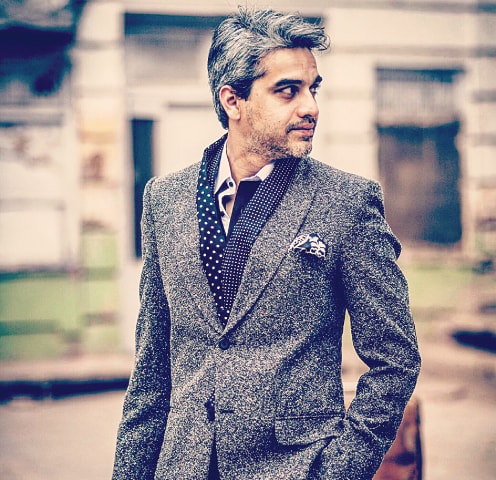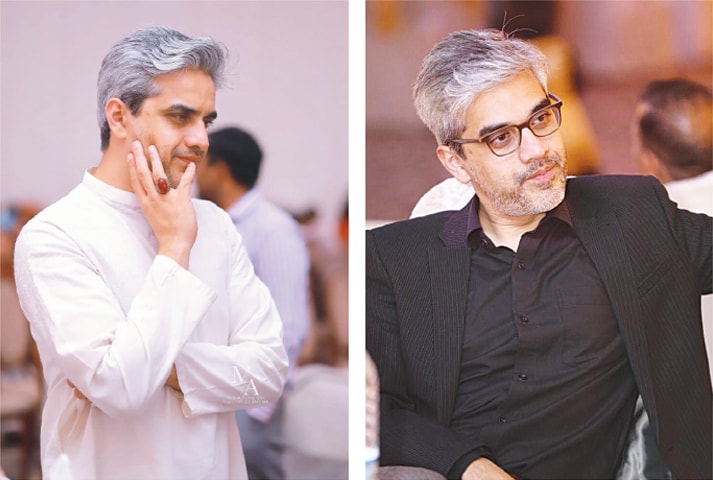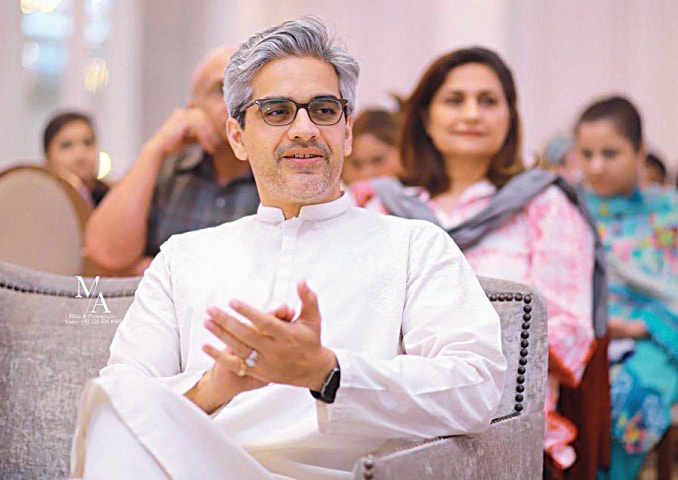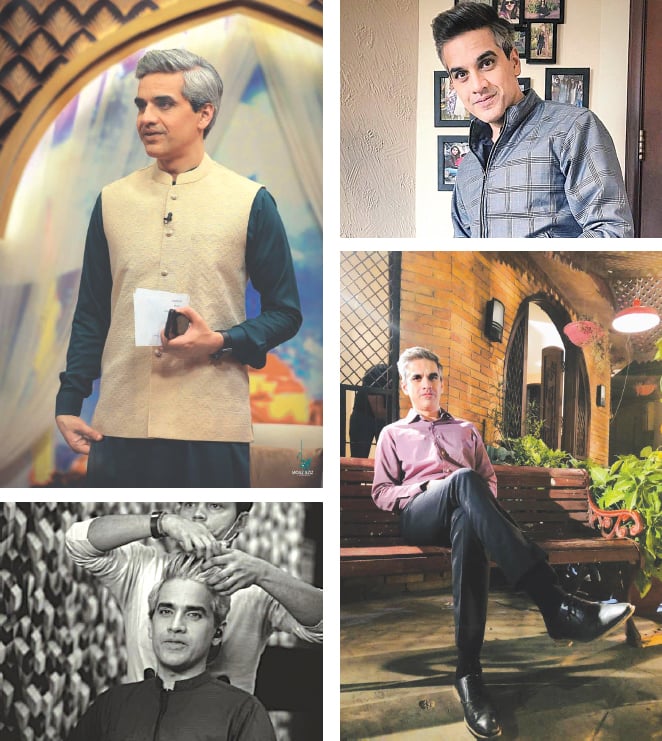
When an actor begins to be referred to by his on-screen name, it’s an indication of a job done well. And Omair Rana is being called ‘Sarwar’ these days. He has been proving his mettle as a villainous, lecherous stepfather in the currently airing drama Pyar ke Sadqay, adroitly making Sarwar one of TV’s most hated men. Omair’s inbox these days is often littered with hate messages, from random people cursing him with abandon. That’s a job well done, indeed.
Quarantined in his home, Omair ponders that perhaps the lockdown due to the coronavirus pandemic has its benefits. “I haven’t gone to a mall or any public place, so I haven’t had to face any negative comments face to face,” he grins. “But social media is another story. The most common reaction I get is the comment, ‘You’re so nice but Sarwar is so bad’. That’s a relief. It would be so wrong if people liked Sarwar and what he did. At the same time, it’s great that they are able to differentiate the actor from the character.
“But there was also this recent message that was cursing me, telling me to ‘leave Abdullah!’ [the name of his stepson in the drama, played by Bilal Abbas Khan]. I literally laughed out loud, but perhaps that was because the insults were in my inbox, delivered from a distance.”
There have been other instances, in pre-Covid-19 times, when Omair has antagonised Pakistan’s very emotional drama-loving audience. In Piya Bedardi, a drama that was broadcast back in 2017, he played the evil father. “The drama’s director was watching the initial episodes with his family and everyone was really liking them,” Omair remembers. “Then came the scene where I was forcefully stuffing food into children’s mouths and the director’s mother got up and stormed out of the room, declaring, ‘Aye munda jahannumi hai’ [this boy will go to hell]! The director warned me not to meet his mother,” he laughs.
Omair Rana’s journey as an actor has been a long one, traversing theatre before touching down on television and even a film. He regularly receives abuse for his negative characters. But he has no regrets, he says. He’s not in it for the fame
But no character played by him has received as much attention — or inspired as much hate, for that matter — as Sarwar. Omair has been exceptional, taking on his character’s many shades: the slow malevolent smile, the ominous whistle, the eyes that narrow as he plans out new ways of manipulation, the predatory glint as he tries to get close to Mahjabeen, played by Yumna Zaidi. He recalls that, when he first started working in the drama, his co-star Atiqa Odho told him that it was going to be a game-changer for him. “She was right,” he says, “this role really is proving to be my most memorable TV performance yet.”
The drama life

Luckily for me, I’m able to talk to the actor at this point in his career, when he is starring in one of TV’s most talked-about dramas at the moment and winning rave reviews. Under normal circumstances, this may have had been difficult, since Omair had already started working on his next project after wrapping up Pyar ke Sadqay. But Covid-19 has put drama shootings on hold for now and I meet the actor ‘virtually’ via a very convenient application called Zoom. “Isn’t this convenient?” he says. “Why can’t virtual meetings just be the way we all communicate generally?” He’s even coined the word ‘zelfie’ — for the uninitiated, that’s a ‘Zoom selfie’!
When does he plan on going back to work? “Soon,” he says, “we all have to ultimately return to work. But it has to be while strictly following SOPs [Standard Operating Procedures]. I was part of a Ramazan transmission all through this past month and I had to be extra careful. Other people around me could wear masks but I couldn’t wear gloves or a mask, and I had to make sure that my social distancing wasn’t compromised. Now, as we return to drama sets, we need to stay vigilant and so do the channels that we work for.”
Is his next role a negative one as well? “No, I have made a deliberate decision to not work in more negative roles for now,” he says. “I have acted out positive as well as negative characters, but I do realise that the latter have been noticed more. Having said this, I don’t want to be pigeonholed into a certain genre. I would like to work on a positive character, but give him shades and make him interesting rather than neutral or forgettable.”
Will his drama directors allow him to add these changes to his character? “I hope so,” says Omair. “I’m a director’s actor and I don’t like changing the script. But sometimes, actors do add nuances to the characters that they are playing. Even before I sign a project, my first priority is to look at the arc that my character has in the plot and understand the overall story. Then, I look at who the director is, because, ultimately, the drama is going to be created according to his vision. Finally, I see who I’ll be working with.
“If I like the project, I won’t bargain too much over my remuneration. If I don’t, I’ll quote a price that they’ll just have to refuse,” he grins.
But even with a strong script, local dramas run the risk of disengaging their audience when they drag on and on, don’t they? It is no secret that, once a drama starts bringing in high ratings, extra scenes are added in order to stretch its duration for a few more episodes. Does it irritate him when a project that he’s worked hard for, starts getting diminished like this? “It’s like, producers realise that this chewing gum tastes good, let’s stretch it a bit more,” Omair observes. “And yes, as a storyteller, an actor and an audience, it irritates me tremendously. I believe that a story should be told in the best, most crisp way, but if a drama wraps up quickly, it won’t be able to cover its costs. The need to get more ratings and more commercial sponsors basically ends up ruining so many storylines. There is not much that an actor can do about this.”
People think that TV is amazing but they have yet to witness the power of great theatre. And I’ve always played the protagonist in theatre, so I’ve had a taste of it plenty of times.”
The highs and lows of being an actor in Pakistan

We shift focus to his journey as an actor. It has been a long one, traversing theatre before touching down on television. Two decades ago, Omair was the ruling hero in many major Pakistani theatrical acts. Now, he wields considerable clout as a character actor on television. However, when he started off his TV career, did he want to be a character actor or, like so many others, did he dream of playing the hero?
“No, not tremendously,” he muses. “I’m not in it for fame. It excites me when I play new, different characters. If I have a dream, it is to bring people flocking to theatres. Majid Maqbool, my fellow thespian and ex-boss, once said to me that, if a picture is worth a thousand words, then being here on stage is worth a thousand pictures. People think that TV is amazing but they have yet to witness the power of great theatre. And I’ve always played the protagonist in theatre, so I’ve had a taste of it plenty of times.
“To be honest, the bigger challenge for me was this,” he points to his silver hair. “I was told that I wouldn’t get accepted on television because my hair is entirely grey. But I have more faith in my audience.”
Does he have enough faith in the audience to believe they will continue watching Pakistani dramas when they can opt for international content? Many actors have voiced their fears that — now that the Urdu-dubbed version of the Turkish drama Ertugrul is a hit — more similar ‘imports’ may start airing on TV, thereby reducing opportunities for local producers. Does he agree? “Not necessarily. Pemra has regulations regarding how much foreign content can be aired, and at what timings it can be shown. As long as they are followed, we won’t have a problem. I’m happy to see our national broadcaster earning huge profits from Ertugrul but, as an actor and a citizen of Pakistan, my primary concern is what they are going to do with this money.
“Investments need to be made into PTV’s regional stations. So many regional actors have now had to resort to driving rickshaws and taxis because there is no work for them. They need to create a channel for children. And the content needs to be Pakistani. They need to work on productions that make our next generations aware of our culture. Our cultural history is extensive, there is so much content right there!”
It remains to be seen whether PTV will be able to rise from the ashes with the aid of its earnings from Ertugrul. But now that he has mentioned how so many actors end up living difficult lives, does he ever regret joining a profession where financial viability fluctuates often? “I don’t regret it because I love what I do but, yes, from a financial perspective, acting is extremely risky,” he says. “Actors and everyone else involved in a project are basically daily-wagers. Our lives may look glamorous on screen or on social media, but this ultimately does not ensure a regular pay cheque every month.

“We aren’t protected with royalties which, in the long run, means that our careers aren’t truly sustainable. I have no shame in saying this, but I can empathise with the man that curls up on the floor and cries because he doesn’t know how he will feed his children. It is a very scary feeling.
“And then, you start thinking: what skill do I lack? How much effort have I not put in? Munna Lahori, who played the title character in Ainak Wala Jinn, died a pauper. How is it possible that someone who gave us immeasurable moments of joy, dies like that? We desperately need a system that protects the rights of actors.”
And yet, Omair has no regrets. “I tried out different jobs before I began pursuing acting full time. This is what I’m meant to do.”
Omair is going to be seen next in Sarmad Khoosat’s movie Kamli, scheduled to release whenever the coronavirus pandemic comes under control and cinemas reopen. He’s also acting in a drama titled Dil Na-Umeed Tau Nahin which also stars Yumna Zaidi. He isn’t playing a negative character but a positive one, with shades, moods and small, all-important characteristics that will make it real. That’s right up Omair Rana’s alley.
Published in Dawn, ICON, June 7th, 2020














































Dear visitor, the comments section is undergoing an overhaul and will return soon.